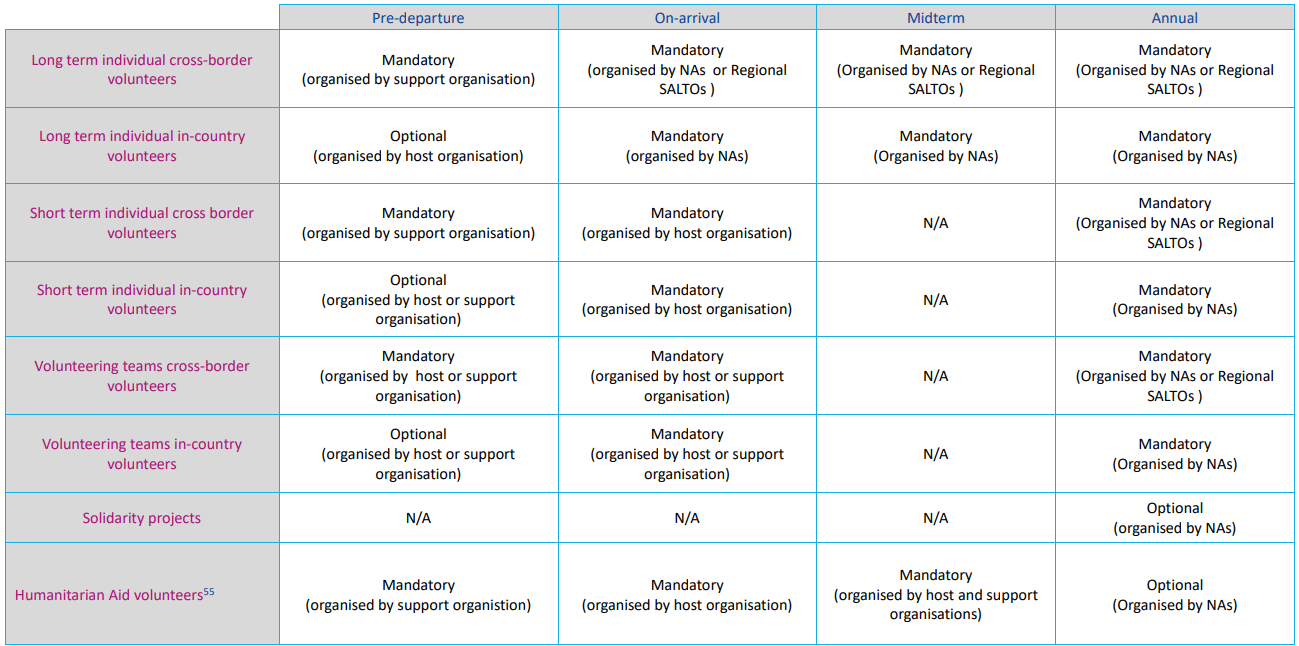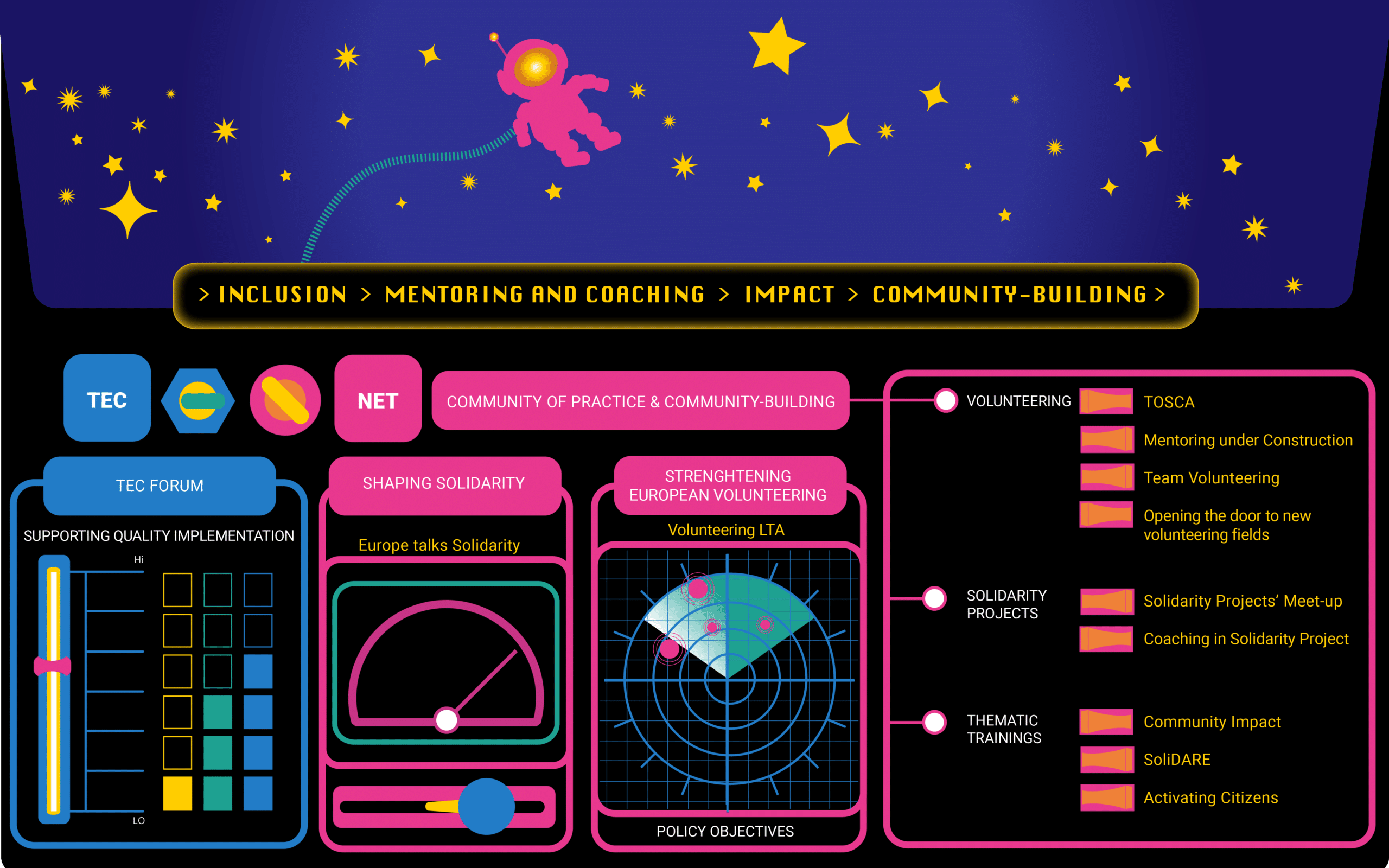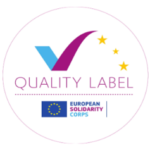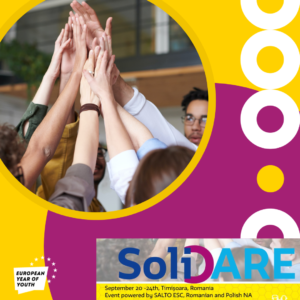

Module 4: Training Activities
Training Activities
It is time to meet the “dark matter” of the ESC Space: TEC, NET, GOT, OLS, HOP, NAM, LTA, SNAC, TOSCA… and so on. This may seem like going out to get almond cakes, but no; you are in fact about to collide with the galaxies where the training magic happens.
Training activities in the European Solidarity Corps are divided into two budget lines with specific objectives and rules: TEC and NET. In this module, you will be introduced to both.
TEC – Training and Evaluation Cycle
TEC stands for Training and Evaluation Cycle. The main objective of TEC is to ensure the quality of an ESC volunteering experience.
The National Agencies and Regional SALTOs have the responsibility to organise training for incoming and outgoing volunteers and organisations holding a Quality Label in their country/region.
TEC activities only cover cross-border volunteering, with two target groups: volunteers and organisations.
In addition to TEC for volunteers and organisations, NAs and SALTOs have the option – within TEC – to organise trainings for mentors offering support and reinforced mentoring to participants in volunteering activities.
Humanitarian Aid volunteers are an exception – more information can be found on the EACEA’s website.
TEC for Volunteers
The TEC for volunteers consists of 4 training entities in which ESC volunteers can or must participate:
- Pre-departure training
- On-arrival training
- Midterm evaluation
- Annual European Solidarity Corps Event (optional for Humanitarian Aid volunteers and participants in solidarity projects)
Watch the video below to see what the objectives of each type of event, who is responsible for organising them, what are the other prerequisites, and how the TEC is linked to ensuring a high-quality experience for youth:
TEC for Organisations
The TEC for organisations includes two types of events for organisations with a Quality Label:
- Training for organisations that have recently obtained a Quality Label
- Annual national event for organisations holding a Quality Label
The annual event for organisations can be combined with the annual event for young ESC participants.
TEC for Mentors
The Training and Evaluation Cycle for mentors is optional and consists of trainings for mentors offering support and reinforced mentoring to participants in volunteering activities.
Trainings for mentors can be physical, virtual or include blended activities.
National Agencies and regional SALTOs are responsible for organising such trainings for mentors as needed and they can opt to subcontract all or some of the sessions. However, the NAs/SALTOs should remain involved in the sessions as much as possible and keep regular contact with the trainers and with the mentors.
The training should:
- ensure understanding of mentor’s roles and responsibilities;
- give appropriate practical and technical information on the programme characteristics relevant for volunteers;
- ensure that mentors know how to guide and provide support to the volunteers in identifying the learning acquired during their experience;
detect wellbeing issues that are commonly encountered in the volunteering activities and support the participants in finding help; - offer guidance for reinforced mentorship for young people with fewer opportunities;
- provide networking opportunities for mentors.
How to organise the TEC in practice?
All TEC activities must comply with the minimum quality standards laid down in the European Solidarity Corps Guide. Content-wise, the ESC Guide, TEC Forum and other ESC officers are your best sources of information.
The financing principles and the division of responsibilities among the organisations involved (National Agencies, regional SALTOs, and the EACEA) are explained in detail in the NA Guide.
The table below, extracted from the ESC Guide, indicates the mandatory and optional training sessions for each action and type of activity, and who is responsible for their organisation.

An NA/SALTO may organise TEC activities or subcontract an expert organisation to manage all or some of them. In any case, the you should stay involved in the sessions as far as possible and maintain regular contact with the trainers.
As an ESC officer, you must also ensure that outgoing volunteers receive the information kit and incoming volunteers receive the eco-tips information package.
After each TEC event, you must encode the data on the TEC activities carried out in the monitoring tables of the National Agency Module (NAM).
How does SALTO ESC support you in organising TEC?
The TEC Forum is a space for cooperation that we offer to support ESC officers in implementing the training and cooperation cycle. The TEC Forum is an annual event where we meet with TEC trainers, the European Commission and some of you to discuss and address common issues. You are warmly welcome to join us and contribute to the development of TEC!
The TEC Forum supports capacity building for TEC trainers. It is the only international exchange forum focused on them – a way for them to feel supported and stay informed of important changes in the field. This is what makes it unique and significant.
General Online Training (GOT)
In addition to TEC, the European Commission also offers training for young people. General online training is an open-access training, via the Solidarity Corps portal, for all registered candidates and participants.
GOT offers modules on various topics e.g., European values, ethics, health and safety, integrity, or more specifically on topics targeted for ESC participants, such as the roles and responsibilities of the participants or the mission of the European Solidarity Corps.
The GOT includes a Guidebook for youth workers to help enrich the General Online Training experience and empower young people to engage in offline activities as well.
Online Language Support (OLS)
In addition to the TEC and GOT, young ESC participants also receive linguistic training. For this purpose, the European Commission has produced the Online Language Support (OLS) tool.
The OLS is available at the EU Academy, which is an EU-owned online hub containing educational resources produced by EU institutions. ESC participants can take as many language courses as they wish in the OLS tool.
The role of the NAs is to ensure that ESC volunteers receive adequate linguistic support. If a language isn’t available in OLS, language support takes the form of a grant (EUR 150). In such cases, language learning is organised by the participating organisations.
NET – Networking Activities under the European Solidarity Corps
Just like the TEC, NET activities are also aimed at improving the quality of the ESC implementation. Networking Activities allow National Agencies to strategically develop the programme implementation, building closer links with policy development.
Consequently, in the NET planning process, the National Agency must consider the strategic documents, such as the EU Youth Strategy and the annual European Commission (Erasmus+ and) European Solidarity Corps Work Programmes.
The NET activities may have as objectives:
- to promote the European Solidarity Corps,
- to train, support or offer contact-making opportunities for potential organisations and participants,
- to raise awareness and promote the exchange of practices related to the objectives, priority target groups and themes of the programme,
- to evaluate and analyse programme results,
- to support and develop community building networks, alumni networks and post-placement guidance and support practices.
NET activities focus on the ESC community of practice: young people, individuals and organisations active in the areas of the European Solidarity Corps, and/or stakeholders acting as multipliers.
How to organise the NET in practice?
Every National Agency must appoint a NET officer/officers to be responsible for the planning, implementation, and evaluation of the NET. The National Agencies submit their NET plan to the European Commission as a part of the yearly work planning process. However, the NET plan can be changed and/or activities can be added at any time.
EC instructions on the NET budgeting are available in the NA Guide.
TCA/NET Officers’ meeting
Since an NA needs partners to implement its NET plan, an integral part of the NET planning is done at the TCA/NET Officers meeting. These meetings are organised at least once a year by the SALTO Training and Cooperation and supported by the TCA/NET working group where SALTO European Solidarity Corps has a seat.
At the meeting, TCA/NET officers and SALTO staff discuss, share information, and develop joint strategies and projects. The Commission is also present. TCA/NET Officers present their application and offer with the aim of finding NA/SALTO partners with whom to implement their plans.
The summary and materials of the TCA/NET meetings are shared in the HOP Platform (see in more detail below) in a dedicated area.
A National Agency may act as the long-term activity (LTA) coordinator (in the Youth field they are also referred to as SNACs) or organiser (host) of a single NET activity or a recurrent activity. For the TCA/NET NAs can also be in sending role, meaning that they fund the participation of applicants at events hosted by other NAs.
European Training Calendar
Once the NA/SALTO finds partners and is ready to carry out the NET activity, a call for participants is published in the European Training Calendar hosted on the SALTO Youth website. The application, preselection and selection procedures are carried out in the calendar system. A MySALTO account with an NA/SALTO profile provides access to the calendar backend.
Once an individual NET activity is carried out, the NET officer encodes the activity data in the monitoring tables of the National Agency Module (NAM).
TCA Almanac
Need help on NET processes? TCA Almanac, also available on SALTO Youth website, is a support space for TCA/NET officers. It contains information and supporting documents for TCA and NET officers in the development and implementation of the TCA/NET strategy and individual activities.
How does SALTO ESC support you in organising NET?
We support NET officers by providing you with strategic tools, information and analysis. In addition, SALTO ESC actively participates in TCA/NET development within the TCA/NET working group.
Our NET support tools include:
- NET Planning Matrix. The Matrix can be used to ensure that all ESC fields receive the attention they deserve on a national level. At SALTO ESC, we use the same matrix to monitor NET offer coverage on a European level.
- An analysis of European Solidarity Corps’ Networking Activities (NET) 2020–2022. The analysis provides a three-year overview and aims to give advice and insights to guide future NET planning. It also wishes to contribute to a more in-depth discussion between NET officers, especially regarding the links between TCA and NET.
- Analysis of European Solidarity Corps’ national Networking Activities (NET) 2022–2023. The report from this research show how NAs use NET in their national context, what good practices they have and what needs they formulate for the future.
Each spring, we also share a list of proposals for existing and missing activities that NAs can host, join in prep-teams, or express their interest in sending participants to. This will help you broaden your NET activity offer on a national level.
We also coordinate the only long-term NET activity concentrating on the European Solidarity Corps.

SALTO ESC’s training strategy. Illustration: Laura Mellanen | Vaste
Long-term activities (LTA)
Long-term activities are strategic partnerships of National Agencies. In the field of Youth you will also hear people refer to them by the name SNAC – Strategic National Agencies’ Co-operation.
Long-term activities have an impact on the development of the programme and policy area they wish to address. They can last several years and contain a wide range of activities combining offline and online, cross-border and national, training, contact-making, development, production, communication as well as dissemination and evaluation activities.
Most LTAs concern both the ESC and Erasmus+ Youth and are also eligible for funding from both programmes. This varies from country to country, depending on the budgets and objectives of each participating NA.
Currently, there is only one LTA that focuses exclusively on the European Solidarity Corps: Strengthening European Volunteering. You will learn more about it in the next module!
Single and recurrent training modules
Some training courses within the ESC are organised on several occasions because the network of NAs and SALTO ESC recognise that there is a continuing need for some basic training. Training requirements are discussed and training modules are developed in cooperation with SALTO ESC, National Agencies, and experienced ESC trainers.
Organising a fixed training course is easy for an NA: there are manuals on how to organise each module and a pool of qualified trainers to deliver these training modules. It is just as easy (and wise!) to use the opportunity to send participants to these training modules whenever another NA is hosting one.
Our training offer follows a strategy with 5 fields of impact:
- Shaping solidarity
- Strengthening European volunteering
- Embedding solidarity across the EU Youth programmes
- Supporting quality implementation
- Community of practice and community-building
Let’s take a look at the fixed modules currently in place.
Quality Label Experts Meeting
This activity is an international meeting for internal and external Quality Label experts. It is designed for National Agency and SALTO staff, external evaluators, and trainers. The meeting takes place every two years.
 The meeting focuses on Quality Label procedures. It is an opportunity to share experiences and find a common understanding of quality in the Quality process. It supports the motivation and the professional development among QL experts.
The meeting focuses on Quality Label procedures. It is an opportunity to share experiences and find a common understanding of quality in the Quality process. It supports the motivation and the professional development among QL experts.
Field of impact: Supporting quality implementation
TOSCA – Training and support for organisations active in the Solidarity Corps
TOSCA is THE capacity-building training course for organisations with a Quality Label for ESC volunteering activities.
TOSCA helps organisations understand the programme: its objectives, values, rules and processes. It is an opportunity to build partnerships, learn from other participants and cultures, and develop the ability to design volunteering activities with higher quality and more impact.
If you have organisations that have just obtained a Quality Label, it is a good idea to give them the opportunity to participate in a TOSCA training course.
Field of impact: Community of practice and community-building
Watch the video for a preview of a real TOSCA experience:
Solidarity – Opening the door for new fields of volunteering
A partnership-building activity that brings together experienced and newcomer organisations who wish to promote volunteering in fields that are not yet so actively involved in the European Solidarity Corps.
Field of impact: Community of practice and community-building
SoliDARE
 SoliDARE is a conference bringing together organisations and informal groups involved in the ESC. The event aims to build a community for all who feel involved and engaged in the programme. Together, the community explores shared challenges and their potential solutions.
SoliDARE is a conference bringing together organisations and informal groups involved in the ESC. The event aims to build a community for all who feel involved and engaged in the programme. Together, the community explores shared challenges and their potential solutions.
Field of impact: Community of practice and community-building
HOP Online Learning Platform
The HOP is an online learning platform within the Erasmus+ Youth and European Solidarity Corps programmes. It offers an increasing number of online courses on the programmes and different aspects of European youth work. The HOP is aimed primarily at youth workers and project coordinators, but young people and youth policymakers can also benefit from selected courses.
The platform is connected to the NET, as the courses are developed with the NET budget by the institutions implementing E+ and ESC programmes. The platform is run by SALTO Eastern Europe and Caucasus Resource Centre.
Is HOP the solution for you?
The HOP platform includes several courses closely linked to the implementation of the European Solidarity Corps. Let us take you through a couple of offers.
MOOC on the European Solidarity Corps
The MOOC teaches the essentials of the European Solidarity Corps, including: how to organise a Volunteering project and how to become a Corps volunteer, how a youth group can prepare and implement a Solidarity Project, what are the opportunities for a new Humanitarian Aid activity, how to prepare to submit an ESC grant application, how to obtain the Quality Label, and what kind of support is available to young people in ESC projects.
Get a glimpse into the course – an introductory video on YouTube:
Training for Mentors
This self-paced course introduces the essential elements of mentoring in the European Solidarity Corps Programme, as well as the skills and tools to improve as a mentor. It is suitable for both newcomers and experienced mentors.
Youthpass <3 Corps
A self-paced facilitated course to support the learning experience for young ESC participants. The course is aimed at ESC project organisers, mentors, and other support staff, as well as youth involved in Solidarity Projects, introducing them to the Youthpass process and building skills to support learning processes.
For more courses, check the HOP Platform!
Continue Navigating the ESC Space >>
We are approaching our destination. On the radar: the cosmic dimension of Quality!